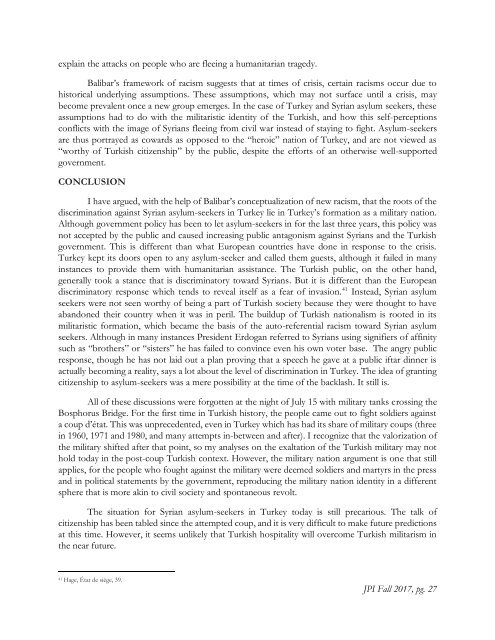Fall 2017 JPI
Create successful ePaper yourself
Turn your PDF publications into a flip-book with our unique Google optimized e-Paper software.
explain the attacks on people who are fleeing a humanitarian tragedy.<br />
Balibar’s framework of racism suggests that at times of crisis, certain racisms occur due to<br />
historical underlying assumptions. These assumptions, which may not surface until a crisis, may<br />
become prevalent once a new group emerges. In the case of Turkey and Syrian asylum seekers, these<br />
assumptions had to do with the militaristic identity of the Turkish, and how this self-perceptions<br />
conflicts with the image of Syrians fleeing from civil war instead of staying to fight. Asylum-seekers<br />
are thus portrayed as cowards as opposed to the “heroic” nation of Turkey, and are not viewed as<br />
“worthy of Turkish citizenship” by the public, despite the efforts of an otherwise well-supported<br />
government.<br />
CONCLUSION<br />
I have argued, with the help of Balibar’s conceptualization of new racism, that the roots of the<br />
discrimination against Syrian asylum-seekers in Turkey lie in Turkey’s formation as a military nation.<br />
Although government policy has been to let asylum-seekers in for the last three years, this policy was<br />
not accepted by the public and caused increasing public antagonism against Syrians and the Turkish<br />
government. This is different than what European countries have done in response to the crisis.<br />
Turkey kept its doors open to any asylum-seeker and called them guests, although it failed in many<br />
instances to provide them with humanitarian assistance. The Turkish public, on the other hand,<br />
generally took a stance that is discriminatory toward Syrians. But it is different than the European<br />
discriminatory response which tends to reveal itself as a fear of invasion. 41 Instead, Syrian asylum<br />
seekers were not seen worthy of being a part of Turkish society because they were thought to have<br />
abandoned their country when it was in peril. The buildup of Turkish nationalism is rooted in its<br />
militaristic formation, which became the basis of the auto-referential racism toward Syrian asylum<br />
seekers. Although in many instances President Erdogan referred to Syrians using signifiers of affinity<br />
such as “brothers” or “sisters” he has failed to convince even his own voter base. The angry public<br />
response, though he has not laid out a plan proving that a speech he gave at a public iftar dinner is<br />
actually becoming a reality, says a lot about the level of discrimination in Turkey. The idea of granting<br />
citizenship to asylum-seekers was a mere possibility at the time of the backlash. It still is.<br />
All of these discussions were forgotten at the night of July 15 with military tanks crossing the<br />
Bosphorus Bridge. For the first time in Turkish history, the people came out to fight soldiers against<br />
a coup d’état. This was unprecedented, even in Turkey which has had its share of military coups (three<br />
in 1960, 1971 and 1980, and many attempts in-between and after). I recognize that the valorization of<br />
the military shifted after that point, so my analyses on the exaltation of the Turkish military may not<br />
hold today in the post-coup Turkish context. However, the military nation argument is one that still<br />
applies, for the people who fought against the military were deemed soldiers and martyrs in the press<br />
and in political statements by the government, reproducing the military nation identity in a different<br />
sphere that is more akin to civil society and spontaneous revolt.<br />
The situation for Syrian asylum-seekers in Turkey today is still precarious. The talk of<br />
citizenship has been tabled since the attempted coup, and it is very difficult to make future predictions<br />
at this time. However, it seems unlikely that Turkish hospitality will overcome Turkish militarism in<br />
the near future.<br />
41 Hage, État de siège, 39.<br />
<strong>JPI</strong> <strong>Fall</strong> <strong>2017</strong>, pg. 27
















